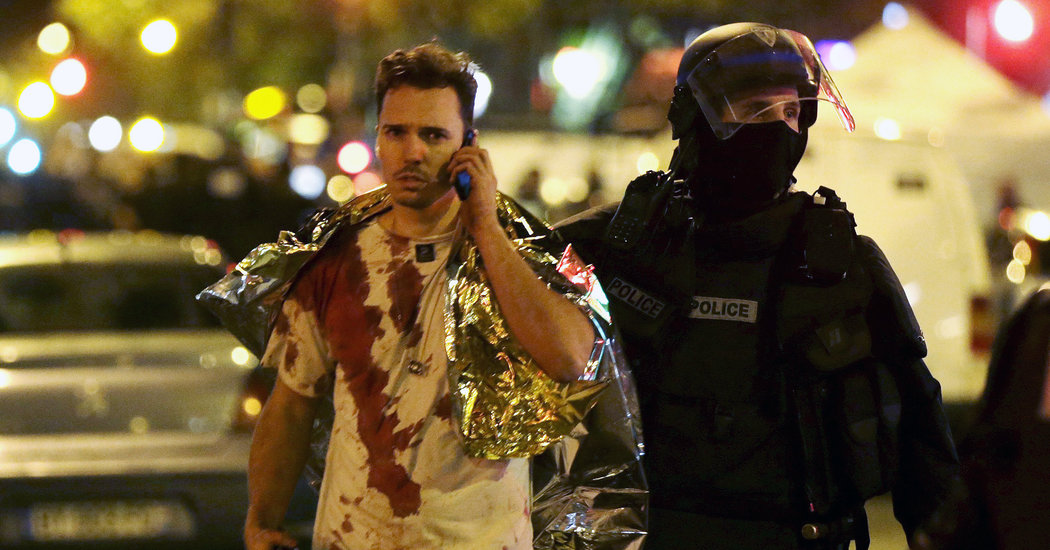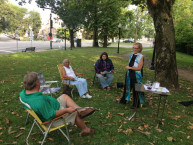 November 15, 2015: May God’s words alone be spoken, may God’s words alone be heard. Amen.
November 15, 2015: May God’s words alone be spoken, may God’s words alone be heard. Amen.
Well, here we are again…dwelling in the aftermath of violence – of a world in chaos and crisis. The news from Paris on Friday evening stopped us all in our tracks. We are changed, or we should be, whenever we encounter these types of horrific acts of violence born of hate. The pictures of the bodies laying covered by sheets in the streets, the fear of families not knowing if their loved ones were dead, captured, or wounded, the news that 129 people were killed, many more wounded, and all of it something planned, calculated, and wanted by another group of people.
An act of war, in an already war torn world.
And we are left to wonder why? What now? How do we work toward peace when our hearts our filled with rage born of pain? This is where we are today, as we gather here in this church, on this Sunday – perhaps in search of where God is in all of this, and to seek the peace of fellowship in Christ needed so desperately now.
It could not have been lost on any of you the words of Jesus in the gospel this morning, and how strangely they echo through the centuries to be what we hear today. Jesus, after doing some smack downs of the elite inside the temple is now outside of it with his disciples.
Now, you gotta understand that the temple in Jerusalem was no small building, but an enormous and beautiful structure – beyond anything these backwater disciples had ever seen. They were admiring the enormity of it – the stones and all the magnificence of the whole thing as they stood in its shadow. Jesus tells them that all that they are admiring will be destroyed – “not one stone will be left here upon another.” Now, imagine how that must have sounded to them? Even though the first temple had indeed been destroyed, that was centuries earlier – far from the realm of possibility in their minds. Then, imagine how that sounded to those living at the time this gospel was written – when that temple was indeed a pile of rocks, with only the Western Wall remaining. To the disciples, it must have seemed impossible, but to those earliest listeners of this gospel, it was their reality. And both would want to know something even more important – where then would God be found?
Where is God if not in the temple?
Because in that time, for the Jewish people, and for most other religions as well, God was found in the temple – in God’s house. If that house was destroyed – what then? Was God destroyed too?
Jesus continues to teach his disciples, talking of “wars and rumors of wars,” that “nation will rise against nation, and kingdom against kingdom” of earthquakes and famine. Sound familiar?
“wars and rumors of wars” – well, they haven’t been rumors for a long time for us now, have they. If only they were. But doesn’t gospel means “good news?” – what gives? Where is the “good news” in that?
These are apocalyptic verses meant to reveal something – makes sense given the Greek, apokálypsis meaning a lifting of the veil – a revealing. So what is Jesus revealing here? What is the good news for us in this time of darkness?
There’s a story of a couple who took their son, 7, and daughter, 11, to Carlsbad Caverns. As always, when the tour reached the deepest point in the cavern, the guide turned off all the lights to dramatize how completely dark and silent it is below the earth’s surface. The little boy, suddenly enveloped in utter darkness, was frightened and began to cry. Immediately was heard the voice of his older sister: “Don’t cry. Somebody here knows how to turn on the lights.” In a real sense, that is the message of the gospel: light is available, even when darkness seems overwhelming.
Jesus is telling his disciples, and us, that our Creator cannot be confined to something built by humans – nor can anything humanity can do destroy God. Not even our horrific need to kill one another over how we understand our Creator. And we certainly seem to want to do that a lot.
There is a “Peanuts” comic strip in which Linus is listening carefully as his sister, Lucy, boasts about her religious faith and her potential as an evangelist. She says to Linus: “I could be a terrific evangelist. Do you know that kid who sits behind me in school? I convinced him that my religion is better than his religion.”
Linus asks: “How did you do that?”
Lucy replies: “I hit him with my lunch box.”
Well, the world has been hit with far more than a lunch box to be sure. It seems proverbial lunch boxes have been whacking heads for centuries, even to today.
But the theologian Elizabeth Johnson once pointed out, “how we speak about God says more about us, than it does about God.”[1] In other words, God cannot be contained within human definitions of “Adonai,” “Allah,” or “God,” or “father” or “mother,” for that matter. And if that is true, then we certainly shouldn’t be killing one another over our differing understandings of God, should we? Though some might argue that this violence is more about empire – about control of people – than about religion, and there is truth to that. God is everywhere, not boxed into temple buildings or religious doctrine, and God does not live in the shadows of human empire either. But Jesus is telling us something more too, something so profoundly needed at this moment.
Like those amidst the temple ruins, we too have had our sense of security shattered – our sense of understanding how God works, and how this world we live in is. And in this passage we heard today, Jesus is telling us that the pain we are experiencing are birthpangs, and can, if we are open to it, lead to new life. Christ is giving us new insight into the workings of God in all creation, and new hope in that presence that reveals the fragility of the structures of our day – the empires and their large stones. In the aftermath of darkness, Jesus is shedding light on the deception that humanity can control everything, and that violence can bring about peace. It is a life born out of destruction and death – a new life of hope, like the one we experience in baptism, given to us anew with each difficult moment in our lives.
And today we will experience new life here at Christ Church as we baptize Kylie Paige O’Connor, and renew our baptismal covenant. The feel of the water and the smell of the fragrant chrism – move us from death to life with her. They are the outward and visible signs, of the inward and spiritual grace that God gives freely to us all. We stand and commit to “loving our neighbor as ourselves, as we strive for justice and peace among all people and respecting the dignity of every human being.” And I cannot think of a more poignant moment for us to experience baptism as a community than when we are standing amongst the rubble of violence, death, oppression, and war.
We have been walking in death the past few days, but today we will rise in new life. The birthpangs we experienced – this crisis of terror – have truly revealed something about the fragility of empire and the futility of violence as a means of peace. Jesus is telling us that we are not children of empire, but children of God. In other words, just as God is larger than any temple, we are part of something mightier and more powerful than any oppressive force this world has produced. We just have to choose another way – we have to turn from the violence and destruction to a new life. When we build our lives on a foundation of love, we can truly be co-creators with God of a new world. God is calling us out of the rubble into a life in which we can all work together to build something that will last – to build a world of peace.
David R. Hensen writes in Edges of Faith “There will be wars and rumors of war, but it is not the end of the world. The world ends not with flames and terror, blood and carnage. That’s not what our faith tells us. That’s not what Jesus tells us today in the wake of violence and terrorism. He tells us, “The end is yet to come. Fear not. This is not how the world ends.”
The world ends with peace, not violence.
And that is the end of the world we look forward to. The end of this violent world, birthing a peaceful one. The end of an impoverished world, birthing a just one. The end of a hateful world, birthing a world pulsing with love.
Peace birthed from the depths of violence is a holy child indeed, because violence begets violence. Come, God our great midwife in the midst of our world’s birth pangs and labored groans for renewal. Come, help us birth a new world.”[2]
Yes God.
Come help us birth a new world – a world of peace where there is violence, freedom where there is oppression, love where there is hatred. Help us build the world Jesus gave his life for. Help us be the people we were born to be – not children of empire, but of God – so that the birthpangs we feel today may give over to a life tomorrow of peace for all the world.
Amen.
For the audio of the sermon from the 10:30am service, click here:
[1] Paraphrasing.
[2] http://www.patheos.com/blogs/davidhenson/2015/11/god-our-midwife-birthing-peace-from-violence-and-war/
The Rev. Diana L. Wilcox
Christ Church in Bloomfield & Glen Ridge
November 15, 2015
Pentecost 25 – Year B
1st Reading – 1 Samuel 1:4-20
2nd Reading – Samuel 2:1-10
3rd Reading – Hebrews 10:11-14 (15-18) 19-25
Gospel – Mark 13:1-8




